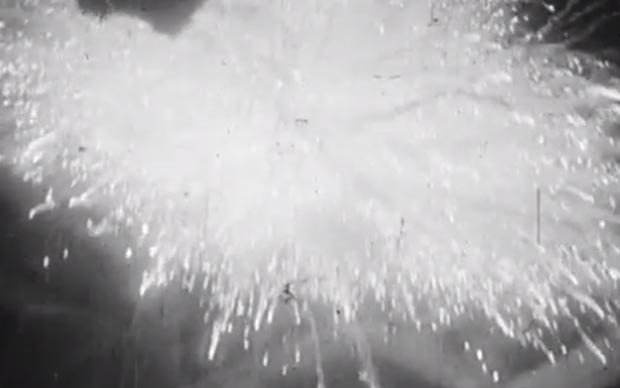The footage was taken from an RAF Lancaster bomber as it was flying at low level during a Second World War raid. It emerged from the archives of the charity Leonard Cheshire Disability, founded by Leonard Cheshire, former leader of the Dambusters who was awarded the Victoria Cross. He was the pilot of the aircraft from which the footage was taken.
He flew three times over the Gnome et Rhone aero-engine factory in Limoges, France, almost as low as ground level, giving time to the 500 workers inside the factory to escape before dropping the flares. What made the mission even more difficult was the fact that it was located in a valley with two water towers and a chimney.
Cheshire was the first of the 12 Lancasters to drop the bomb, followed by the other 11 shortly after. Only one man from inside the factory lost his life, because he returned to find his bike, which he left inside. All the other men survived. The operation was considered a success. Cheshire mentioned the mission in a letter he wrote on Feb. 8, 1944: “In order to give those in the factory the best chance of escaping and not to put anybody’s life in danger, I did three low level runs over the top and then waited five minutes before dropping my markers.” He continued saying that if he wouldn’t have warned the workers inside, it would most certainly had caused serious casualties and more people would have lost their lives.
His fellow soldier, who filmed the scene from the aircraft said that he never felt so close to a target before and that it seemed as if it was posing for the camera, as if it was right under his nose and that the aircraft almost scraped the factory roof, The Telegraph reports.
The dramatic footage was discovered in the archives of the charity Leonard Cheshire and sent to be converted to a digital format to the British Film Institute. It was recently released, in time for the commemoration of the 70th anniversary of the raid.
Chief executive at Leonard Cheshire Disability, Clare Pelham, said Cheshire saved the life of 500 people and this is a story people can learn from and a story worth to be shared to mark the 70th anniversary of the raid. Like many others who lived through the war and fought for their country, Cheshire was affected by the conflict and the loss of so many innocent lives of his generation. He did everything he could to save those people on Feb. 8, 1944. “His letters demonstrate the values that underpin the charity we are today.”
//
